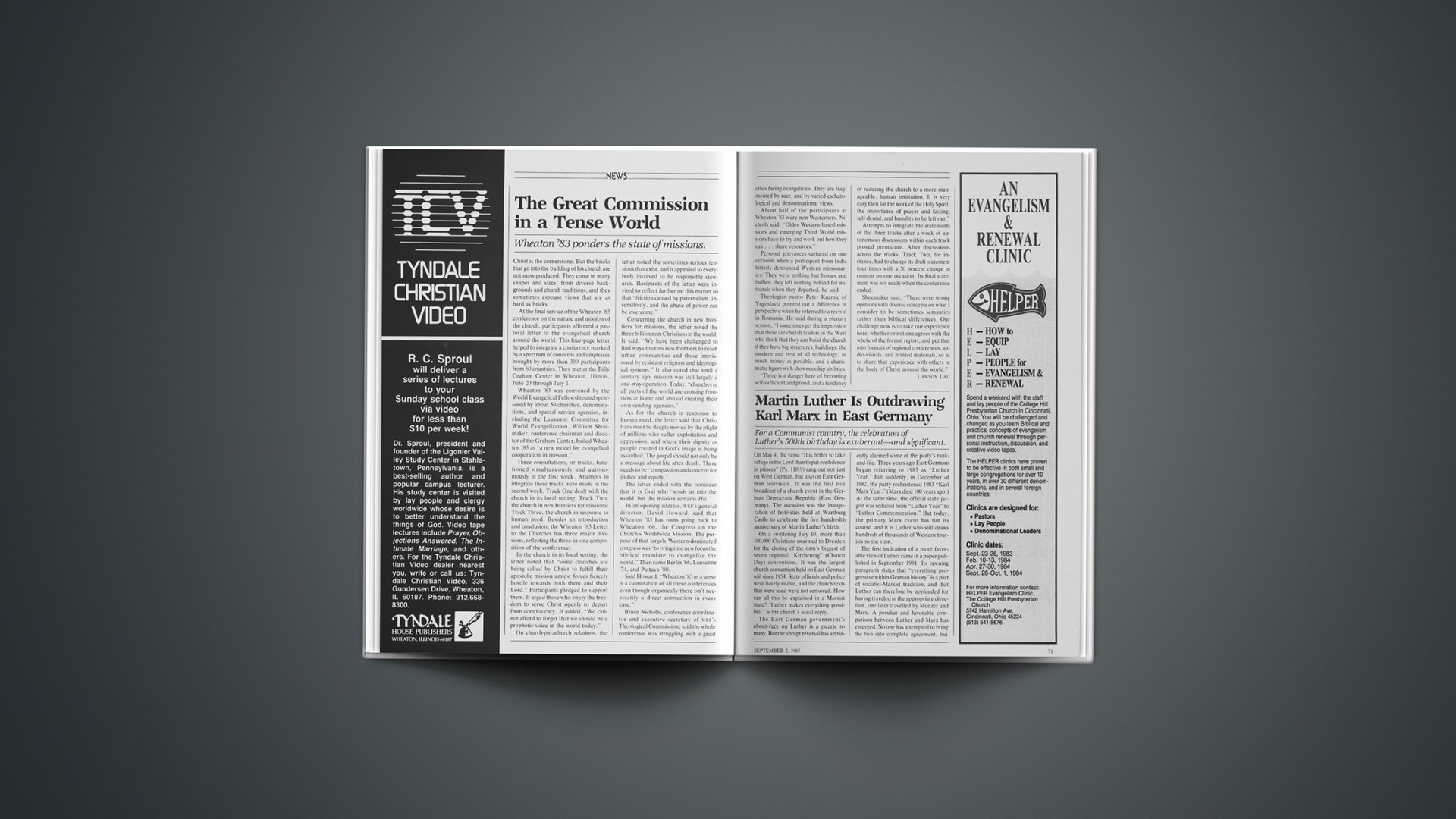For a Communist country, the celebration of Luther’s 500th birthday is exuberant—and significant
On May 4. the verse “It is better to take refuge in the Lord than to put confidence in princes” (Ps. 118:9) rang out not just on West German, but also on East German television. It was the first live broadcast of a church event in the German Democratic Republic (East Germany). The occasion was the inauguration of festivities held at Wartburg Castle to celebrate the five hundredth anniversary of Martin Luther’s birth.
On a sweltering July 10, more than 100,000 Christians swarmed to Dresden for the closing of the GDR’s biggest of seven regional “Kirchentag” (Church Day) conventions. It was the largest church convention held on East German soil since 1954. State officials and police were barely visible, and the church texts that were used were not censored. How can all this be explained in a Marxist state? “Luther makes everything possible,” is the church’s usual reply.
The East German government’s about-face on Luther is a puzzle to many. But the abrupt reversal has apparently alarmed some of the party’s rank-and-file. Three years ago East Germans began referring to 1983 as “Luther Year.” But suddenly, in December of 1982, the party rechristened 1983 “Karl Marx Year.” (Marx died 100 years ago.) At the same time, the official state jargon was reduced from “Luther Year” to “Luther Commemoration.” But today, the primary Marx event has run its course, and it is Luther who still draws hundreds of thousands of Western tourists to the GDR.
The first indication of a more favorable view of Luther came in a paper published in September 1981. Its opening paragraph states that “everything progressive within German history” is a part of socialist-Marxist tradition, and that Luther can therefore be applauded for having traveled in the appropriate direction, one later travelled by Münzer and Marx. A peculiar and favorable comparison between Luther and Marx has emerged. No one has attempted to bring the two into complete agreement, but Marxists are acknowledging the relevance of Luther’s spiritual and theological contributions.
The best explanation of East Germany’s rediscovery of Martin Luther is not the anticipated increase in Western tourists. Rather, it is the GDR Marxists’ search for a past. East Germany party members are proud of their Luther heritage and even reveal a taint of competitiveness with their West German neighbors. They frequently imply that “we are the more genuine caretakers” of the German heritage.
Fifty years ago, Luther’s name was invoked to plug anti-Semitism. But this year, in the moving Wartburg ceremonies, it was emphasized that “Martin Luther was a sinner like unto us and no less dependent upon God’s mercy than we are.” During the ceremonies, three separate requests were made for the forgiveness of all those against whom Luther and his followers had sinned.
There is much within the church’s Luther festivities to warm the evangelical’s heart. Justification by faith, mercy, sola scriptura, and the priesthood of all believers are the most common topics. Probst Heino Falcke has stated that Luther is a mighty witness to all those pastors “who no longer have confidence in the power of their message.”
Luther’s influence is evident in the activity of the church in East Germany. Nearly 15,000 attended the July 9 service in Dresden held by noted East German evangelist Theo Lehmann. Also, in contrast to West Germany. East German evangelicals play an integral role in their Kirchentag. Although the GDR’s population of 17 million is less than a third of West Germany’s, the GDR’S seven regional Kirchentag conventions will host some 200,000, as opposed to the 140,000 who attended West Germany’s single Kirchentag.
The state’s favorable recognition of Luther is one fruit of a growing congeniality between church and state. Three years ago the government expressed a desire for a joint church-state planning committee for this year’s festivities. But the church rejected the offer and has repeated its desire to make its own specifically Christian contribution to East German society. The church has stated clearly that it will not serve as an uncritical amplifier of government policies, and it has maintained obvious control over this year’s church celebrations.
WILLIAM YODER in East Germany










